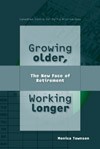Canadian Centre for Policy Alternatives, Ottawa, 2006
$19.95, 254 pages
ISBN: 0-88627-473-7

Review by Ruth Latta
Baby boomers need not be afraid of Growing Older, Working Longer, at least not of Monica Townson's recent book with this title. This 254-page report by an expert in social policy provides a thorough examination of the changing nature of retirement. Townson has been an economic consultant to the United Nations Economic Commission for Europe, served on the Pension Commission of Ontario for 11 years, and was a member of the Canada Pension Plan Advisory Board. Her book Growing Older, Working Longer: the New Face of Retirement in Canada is readable by the layperson, and a must-read for "young" seniors.
Townson does not adhere to the popular notion that the baby boom generation is a time bomb, soon to blow apart the pension and health care systems. The greying of the post-Second World War age cohort is a popular subject for newspaper headlines and TV specials that suggest Canada won't be able to support its aging population and that the burden must be shifted to seniors themselves. These are "doom and gloom predictions," says Townson.
The (international) Organization for Economic Cooperation and Development, however, is urging Canada to get rid of early retirement incentives and to persuade people to work well past "Freedom 55." The International Monetary Fund and the C.D. Howe Institute urge more saving and less reliance on pensions. One hears old buzzwords like "flexibility" along with new buzzwords like "active aging," with idle seniors being a "waste of human capital."
While "activity" and "flexibility" sound positive, says Townson, "we will need to keep a watchful eye on the process to make sure that the much vaunted freedom of choice about life-course and retirement really does offer the free choice Canadians want to have, without replacing the collective responsibility that ensures all citizens are equally protected."
The International Labour Organization contends that providing for the aged is a collective social obligation, with public pensions being fundamental and integral to such provision. Townson agrees, noting that the Canada Pension Plan is in good shape. After being overhauled in 1998, it now has a reserve fund. "Canada's expenditure on income security for seniors is modest by international standards," she writes. "While income gains among low-income seniors have been substantial, it would be difficult to make a case that Canadian seniors have become too rich."
Townson reminds us that, with an aging population, there will likely be less public expenditure in areas such as education, correctional services and employment insurance. Furthermore, retirees pay taxes, which returns money to the system.
Some say that an end to mandatory retirement will be a boon for women, giving them a chance to work longer and build better retirement savings. Townson has her doubts. She notes that 40 per cent of women workers are in non-standard jobs as part-timers, contract workers, self-employed workers, or holders of multiple jobs. They already have "flexibility" in their working lives, and it translates into poor pay, insecurity, and no negotiated pension coverage. "Allowing women to go on working in these types of jobs beyond age 65 is most unlikely to generate more retirement income for them," writes Townson. "Surely a better option would be to improve the benefits under public pension programs on which the majority of women must rely for the bulk of their retirement income."
Women in standard, more secure jobs must also be flexible, juggling their care-giving roles with their paid employment. Studies about seniors working longer for pay tend to be studies of men's working lives, not women's, and show an ignorance of, and lack of respect for, the value of women's unpaid care-giving to the young, the aged, and people with disabilities.
Can older people remedy the labour shortage that currently exists in some parts of Canada? Can they make a contribution to information technology? The fast food industry? As physical labourers? Do skilled tradespeople want to delay their retirement? Townson is dubious. "The challenge will be to make sure that those who advocate . . . "active aging" do not impose their own concepts and value judgments of what is appropriate activity for older people," she concludes.










